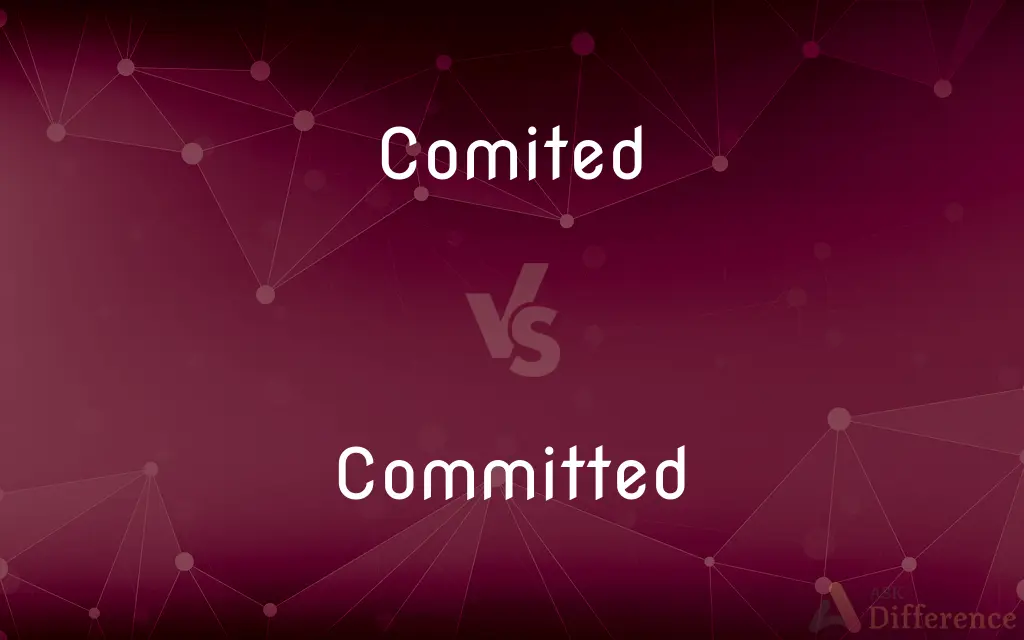Comited vs. Committed — Which is Correct Spelling?
Edited by Tayyaba Rehman — By Fiza Rafique — Updated on April 2, 2024
"Comited" is a misspelling. The correct form is "committed," which refers to being pledged or dedicated to something.

Table of Contents
Which is correct: Comited or Committed
How to spell Committed?

Comited
Incorrect Spelling

Committed
Correct Spelling
ADVERTISEMENT
Key Differences
Remember the phrase "I am committed" with both 'm's.
Associate "commit" with "committee," both having double 'm's.
Recollect that longer dedication requires longer spelling: two 'm's and two 't's.
Visualize the word "committed" when thinking of fully dedicating oneself.
"Committed" has double 'm' and double 't', echoing the pattern in "submit" and "admit."
ADVERTISEMENT
How Do You Spell Committed Correctly?
Incorrect: He was comited for trial next month.
Correct: He was committed for trial next month.
Incorrect: She has comited her life to helping others.
Correct: She has committed her life to helping others.
Incorrect: They haven't comited to a date yet.
Correct: They haven't committed to a date yet.
Incorrect: He comited to the plan without hesitation.
Correct: He committed to the plan without hesitation.
Incorrect: The company is comited to sustainability.
Correct: The company is committed to sustainability.
Committed Definitions
Having been consigned or sent, especially to an institution.
He was committed to a mental facility.
Having performed or carried out an act.
The suspect committed the crime.
Being in a long-term relationship.
They are committed to each other.
To do, perform, or perpetrate
Commit a murder.
To put in trust or charge; entrust
Commit oneself to the care of a doctor.
Commit responsibilities to an assistant.
To consign for future use or for preservation
We must commit the necessary funds for the project.
To place officially in confinement or custody, as in a mental health facility.
To put into a place to be disposed of or kept safe
Committed the manuscript to the flames.
To make known the views of (oneself) on an issue
I never commit myself on such issues.
To bind, obligate, or devote, as by a pledge
They were committed to follow orders. She committed herself to her art.
To refer (a legislative bill, for example) to a committee.
To pledge, obligate, or devote one's own self
Felt that he was too young to commit fully to marriage.
Simple past tense and past participle of commit
Obligated or locked in (often, but not necessarily, by a pledge) to some course of action.
Showing commitment.
Associated in an exclusive (but not necessarily permanent) sexual relationship.
(rhetoric) Required by logic to endorse the conclusion of an argument.
Bound or obligated, as under a pledge to a particular cause, action, or attitude. Opposite of uncommitted.
Associated in an exclusive sexual relationship; also called attached. Opposite of unattached.
Consigned involuntarily to custody, as in a prison or mental institution.
Bound or obligated, as under a pledge to a particular cause, action, or attitude;
Committed church members
A committed Marxist
Associated in an exclusive sexual relationship
Fully pledged or dedicated.
She was committed to her goals.
Confined or entrapped.
He felt committed to the promise he made.
Committed Meaning in a Sentence
She is committed to completing her education.
They have committed themselves to improving the community.
He committed to running a marathon next year.
The team is committed to winning the championship.
Our company is committed to providing excellent customer service.
The government has committed funds to renewable energy projects.
She committed to a new diet and exercise regime.
The teacher is committed to helping every student succeed.
He's committed to making the project a success.
The organization is committed to protecting endangered species.
Parents are committed to providing the best for their children.
They committed to a vacation in Europe next summer.
The artist committed to a new direction in her work.
She committed to learning a new language this year.
He committed his time to volunteer at the shelter.
The scientist is committed to finding a cure.
The director is committed to a diverse casting approach.
They are committed to maintaining a healthy relationship.
The actor is committed to performing in the play for six months.
She committed her thoughts to her journal every night.
The chef is committed to using locally sourced ingredients.
He committed his resources to the development of the app.
The athlete committed to an intense training schedule.
The author committed to writing a sequel to her popular novel.
The couple committed to renovating their home together.
Committed Idioms & Phrases
Fully committed
Completely dedicated or devoted to a cause or activity.
She is fully committed to her career in medicine.
Common Curiosities
What is the verb form of committed?
The base verb form is "commit."
Why is it called committed?
It comes from the verb "commit," meaning to pledge or dedicate oneself, with the added suffix "-ed" indicating past tense or a state.
What is the pronunciation of committed?
It's pronounced as /kəˈmɪt.ɪd/.
Which vowel is used before committed?
It often depends on the context, but "to" is commonly used before "committed."
What is the singular form of committed?
"Committed" doesn't have a singular or plural form since it's an adjective or verb, not a noun.
Is committed a noun or adjective?
"Committed" can function as both a verb (past tense of commit) and an adjective.
What is the root word of committed?
The root word is "commit."
Is committed an adverb?
No, "committed" is not an adverb.
Which preposition is used with committed?
"To" is commonly used, as in "committed to."
Is committed a vowel or consonant?
"Committed" is a word made up of both vowels and consonants.
Is committed a collective noun?
No, "committed" is not a noun.
What is the plural form of committed?
Not applicable, as "committed" isn't a noun.
Which conjunction is used with committed?
Various conjunctions can be used, such as "and" or "but."
How many syllables are in committed?
Three syllables.
How do we divide committed into syllables?
com-mit-ted.
Which article is used with committed?
Depending on context, "a" or "the" can be used before "committed" when it functions as an adjective.
What is the opposite of committed?
Noncommittal, indifferent, unattached.
Is committed an abstract noun?
No, "committed" isn't an abstract noun.
Is committed a negative or positive word?
Neutral, but it can carry positive connotations when referring to dedication or loyalty.
Is committed a countable noun?
"Committed" isn't a noun, so it isn't countable.
Is the committed term a metaphor?
Not in itself, but it can be used metaphorically in certain contexts.
What is a stressed syllable in committed?
The stress is on the second syllable: "mit."
What is another term for committed?
Dedicated, pledged, bound.
What is the first form of committed?
Commit.
What part of speech is committed?
It can be a verb (past tense) or an adjective.
Which determiner is used with committed?
Determiners such as "this," "that," "a," or "the" can be used when "committed" functions as an adjective.
Is the word committed imperative?
No, it's not imperative. It's either past tense or an adjective.
What is the second form of committed?
Committed.
What is the third form of committed?
Committed.
How is committed used in a sentence?
She is fully committed to her studies.
Share Your Discovery

Previous Comparison
Genisis vs. Genesis
Next Comparison
Emmigration vs. ImmigrationAuthor Spotlight
Written by
Fiza RafiqueFiza Rafique is a skilled content writer at AskDifference.com, where she meticulously refines and enhances written pieces. Drawing from her vast editorial expertise, Fiza ensures clarity, accuracy, and precision in every article. Passionate about language, she continually seeks to elevate the quality of content for readers worldwide.
Edited by
Tayyaba RehmanTayyaba Rehman is a distinguished writer, currently serving as a primary contributor to askdifference.com. As a researcher in semantics and etymology, Tayyaba's passion for the complexity of languages and their distinctions has found a perfect home on the platform. Tayyaba delves into the intricacies of language, distinguishing between commonly confused words and phrases, thereby providing clarity for readers worldwide.


































